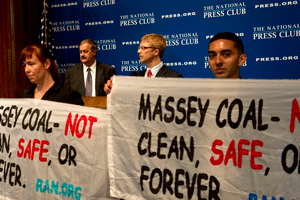
<a href="http://www.flickr.com/photos/rainforestactionnetwork/4819228421/sizes/l/in/photostream/">Rainforest Action Network</a>/Flickr.
Since two of the biggest US coal companies Massey Energy and Alpha Natural Resources announced their merger on January 29, some reports have speculated that Massey’s directors and officers may be using the merger to overcome legal troubles spurred by the Upper Big Branch (UBB) mine disaster on April 5, 2010, in which 29 miners died and two were injured.
Last week, the West Virginia Record reported that one shareholder filed a complaint with the Eastern District Court of Virginia, claiming that Massey directors agreed to merge with Alpha in order to “escape lawsuits over the Upper Big Branch mine explosion.” An earlier New York Times DealBook report on the merger stated that “the combination is also likely to help Massey move past its legal woes arising from safety violations” like the explosion last April, without detailing how. Are Massey’s directors up to fishy business?
Not exactly. Despite the coal giant’s abysmal safety and health record, the deal “looks pretty Kosher,” says Ehud Kamar, a law professor at the University of Southern California. When a company with liabilities like Massey enters a merger, two types of lawsuits are bound to happen, explains David Berger, a partner specializing in merger litigation at the law firm Wilson Sonsini Goodrich and Rosati. The first kind is the wrongful death case, or the lawsuits brought against Massey by families of miners who died in the UBB incident. These lawsuits will proceed uninterrupted by a merger, lawyers say. In this case, Massey exec will remain a defendant in these cases, which, depending on the verdicts, will cost the company between $100 million and $350 million.
The deal between Alpha and Massey appears to be structured as a “standard statutory reverse triangular merger,” meaning that if the deal gets the green light from shareholders and regulators, Massey will become a wholly owned Alpha subsidiary, and Alpha will assume not only Massey’s assets but also its liabilities, wrongful death suits included. Presumably, when Alpha agreed to pay $7.1 billion to buy out Massey, it had already sized up the potential damages that will result from these claims. “The liabilities are sticky,” says Robert Bartlett, assistant professor of law at UC Berkeley. “Someone’s going to have to pay for them.” In other words, there’s no way Massey or Alpha could escape the UBB lawsuits filed by victims’ families, even if they wanted to.
Then why are some Massey shareholders up in arms about the merger? In addition to wrongful death cases, almost immediately following the Upper Big Branch incident several of Massey’s investors filed suit against company executives, the Register-Herald reports, for falsely claiming safety as its top concern “even as it maintained a profits-at-any-cost approach.” These “derivative lawsuits” require that the plaintiffs be shareholders of the company in question both at the time of the damage and during the litigation, Berger says. If and when Massey and Alpha seal the deal, which is expected to happen in the middle of this year, Massey’s shareholders will shed their ownership of Massey and become new Alpha shareholders, rendering them unable to move forward with the lawsuits. Case dismissed. Or, as two Massey shareholders argue in their complaints (PDFs) filed separately (and by the same law firm) in early February, at least eight such cases will be dismissed. A third lawsuit filed against Massey directors after the merger announcement claims that Alpha’s price is unfairly low (one unit of Massey stock for 1.025 shares of Alpha stock plus $10 in cash).
But in the eyes of the courts, Massey’s shareholders aren’t necessarily getting the short end of the stick, lawyers say. In theory there are two ways in which shareholders could be seen as losing out, according to Kamar of USC: either they are getting less than a fair amount of money for their shares because part of the money goes to insure Massey’s directors against lawsuits; or, the directors didn’t negotiate the merger price to the last penny because the deal protects them. In reality, lawyers say neither seems to be the case. The Massey-Alpha agreement allows for a “fiduciary out,” meaning if a better offer comes along, Massey is entitled to at least consider it. Because Massey’s liabilities from the Upper Big Branch disaster is yet undetermined, however, other companies are not likely to make a better counter offer, Jeff Mindlin, manager of the Mindlin Fund, told the Pittsburgh Post-Gazette.
And in eyes of the stock market, Alpha’s offer is fair, given that it represents a 21 percent premium over Massey’s stock value the day before the deal went public. Besides, “if the shareholders don’t think it’s a fair price, they can vote down the deal,” says Berger of Wilson Sonsini, adding that the majority of Massey shareholders appear likely to approve it. Lawyers suspect that the suits opposing the merger may be the result of law firms trying to win money for shareholders who have nothing to lose, rather than the result of a faulty merger.
For Alpha, the liabilities are “well worth it.” After the merge, the company will have a total of 5 billion tons in coal reserves and nearly unrivaled access to Appalachian coal. Alpha’s chief executive Kevin Crutchfield, meanwhile, has said he hopes to resolve the fallout from Upper Big Branch quickly and that discussions with regulators started as soon as the deal was announced.










